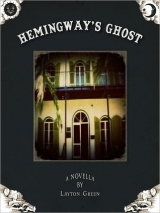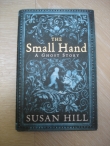
Текст книги "Hemingway's Ghost"
Автор книги: Layton Green
сообщить о нарушении
Текущая страница: 3 (всего у книги 4 страниц)
“You seemed pretty set about it last time.”
He gave a slow nod. “I’ll admit you’re both on my short list. And I know you’ve been breaking into the Hemingway place.”
Papa started to retort, and Sergeant Cohn held up a hand. “I’m not in the trespass business. I’m in the murder business.”
Papa sat back, sullen. Bumby said, “Then why’re you here?”
“I wanted to run a little something by you. How well do you know Lester Scott?”
Bumby shrugged. “Just casually, from stopping by the house so much.”
“Don’t really know him at all,” Papa said. “Why?”
The Sergeant ordered a coffee with cream, then looked from one to the other. “There was a call at the Hemingway house last night.”
Papa did a very poor job of trying to look innocent.
“I took it myself, considering the circumstances. When I got there Lester told me some kids had shot out a window in back of the house. Sure enough, one of the back windows was busted. What I found curious, though, was the angle of the impact hole. From my reckoning, which is pretty damn good, the best place to fire that shot would’ve been from Lester’s balcony. I suppose some kid could’ve climbed up there and done it, but why? On the other hand, why would Lester do it, unless he was shooting at someone? Also, I never found the slug, and I doubt some kid would’ve had the time or sense to retrieve it.” He shook his head. “Any way you two could help me sort this out? It’s quite a puzzle. Oh, and my deepest condolences for your friend.”
Papa grunted. “You ask Lester?”
“Of course. He claims he’s as confused as I am, and was asleep when it happened, so he doesn’t really know.” He put his hands up. “Except for the strange evidence, I’ve got no reason to suspect otherwise, so I didn’t bring him in. He’s never caused trouble before.” He put his hands on the table and leaned in. “You gentlemen wouldn’t know why Lester might have any reason to cause trouble, would you?”
“Sure we do,” Papa said.
Sergeant Cohn leaned back. “Oh?”
A chicken ran by their table, tiny crooked feet crunching into the sand. All three followed it with their eyes.
“Because,” Papa said, “he’s a poor man living life for the benefit of rich folks. I’d be pissed off too. If I was caretaker, I’d have shot out the windows in that house a long time ago, and probably burned it down as well.”
“I’m not,” the Sergeant said quietly, “someone you want to jerk around.”
Papa, who on another day would have been cowed by the Sergeant’s quiet menace, said, “What’ve I got to lose by jerking you around? Maybe you’ll throw me in jail and save my life. Sergeant, I got no idea why old Lester might’ve shot out the window from his own back porch. If I did I’d tell you, believe me. Personally I think it was Jean-Paul. I think there’s something in that house he don’t want anyone else to have.”
Bumby had been listening to Papa and the Sergeant with thoughtful eyes. “I’m beginning to think that myself.”
“Jean-Paul’s no saint, but there’re one or two more things you might ought to know about Lester. His father was caretaker at the Hemingway place before he was, back when Hemingway himself was around. Back in ‘62, three days before the first anniversary of Hemingway’s death, a couple of drifters broke into the Hemingway house and helped themselves to a few things. You know what happened to those two drifters?”
Papa shrugged. “They went to jail?”
“They were murdered.”
Bumby flinched as the chicken ran back across the floor of the restaurant, this time stepping on his foot.
“Not just murdered, but butchered in some kind of ritual. They were both found strung upside down from a cross in the old church off Petronia.”
“Jesus,” Bumby muttered.
“Jesus is right. Worst unsolved murders in Key West history, though no one knows about it because they were homeless, and we kept it low profile. You want to take a stab at who one of the suspects was?”
Papa’s eyes met the detective’s, a look of disbelief on his face. “Lester?”
“Not Lester. His daddy. He had an airtight alibi, but the chief of police never liked him. Before he was caretaker he was a drifter, a bad poet and a day laborer, but then again so are half the people in Key West. He also hung out at the occult bookshop, the one that used to be down by the port, but again, so did half the crazies on the island.”
“So why was he a suspect, if he had an airtight alibi?”
“He was the last one seen with the two drifters, drinking with them at a watering hole down at the docks, and he was also seen skulking around the church on Petronia a few nights before it happened. His alibi for the murders checked out, and he said he was just out walking around the church. It’s a small island. The Hemingways themselves vouched for him, said Ernest had loved him, and that Lester Senior had always been devoted to the family. Some people said he was Hemingway’s biggest fan on the island, which is saying something. And one source,” Sergeant Cohn paused and looked at Bumby, “went on the record to say that Lester Senior was flat out in love with his boss. Said Lester Senior told him one night at the bar that he had to be with Ernest forever, and that he’d found a way to do it.”
Bumby turned away from the Sergeant’s stare. “What’d he mean by that?”
“Who knows. Old Lester died in ‘73, and his son took over at the house. Never had any trouble with him either, though he’s a bit slow, if you know what I mean.”
Sergeant Cohn took a last sip of coffee and stood. “Anyway, thought you might want to know.” His lips peeled back in a mock grin. “You two sure there’s nothing you want to tell me?”
Papa folded his arms and looked away, and Bumby studied his soup.
“You know, you two might want to think about going to the mainland for a while. And if I were you, I might leave during the daytime.”
The Sergeant tipped his hat and walked away.
I giggled as I watched them.
Bumby and Papa stared at the table after Sergeant Cohn left, then at each other.
“I’m still not convinced it ain’t you,” Papa said. “But I think it’s Jean-Paul more, and I think Sergeant Cohn’s covering for him. That’s what cops do for rich folk.”
“That was some strange stuff about Lester’s pop.”
“I don’t think old Lester’s got it in him, and what’s the motive? At least Ernie’s not around, God rest his soul, to talk about the Man’s ghost any more.”
“Poor Ern,” Bumby said. “He never hurt a soul.”
“He was a coward,” Papa said, because it made him feel better about his own cowardice, “but I suppose he was all right.” He looked to the side and shook his head. “Dammit, Ern,” he said softly.
“If you’re not the murderer, and I don’t think you are because someone fired that shot,” Bumby mused, “although I suppose you could be teaming up with someone. But if you’re not, then one of us is next, unless we leave or do something about it.”
“I ain’t leaving. I swore when I came here this was the last stop. I’ve been everywhere else, done everything else, and this is the end of the line for me.”
So maybe the fat fuck did have an ounce of courage.
Bumby said, “I say we take them one at a time. I don’t think it’s Lester either, but he likes to cast off the pier at dusk. I say we search his place tonight when he’s out, and see if we find anything. If we don’t, then we find a way to get into Jean-Paul’s place.”
Papa thought about if for a moment, then downed his whiskey. “I’m good with that.”
They waited in a bar down the street until they saw Lester pass by with his pole and tackle box, and an old cooler for the fish. When he disappeared at the end of the street, almost at the water, Papa and Bumby paid their tab and strolled nonchalantly down Whitehead until they passed the house. They scurried into the foliage and then crept along the high brick wall to their climbing spot.
Bumby flopped over the wall and into a pile of bushes, ripping his linen shirt in the process. Papa did the same, landing even more heavily. They both sat on the ground, grunting and panting.
“We can use the ladder to get back,” Bumby said.
“Say Bum, why’re you sticking around?”
“You heard Madame Gertrude.”
Papa’s jaw dropped. “What—you’re here to help the Man’s ghost?”
Bumby stood and brushed himself off. “Let’s go. Lester won’t be gone all night.”
They hurried across the grounds to the crumbling black wood-framed house in the corner, feeding off each other for courage.
The front door was unlocked.
“Told you he was a half-wit,” Papa muttered.
“Leaving a door unlocked within an enclosed estate doesn’t make someone a half-wit.”
“It does when someone just shot out a window.”
“Not if he was the one who did it.”
Papa turned the knob and the door creaked open. The inside looked similar to the outside: run-down and sad. The living room was tidy, but a thin layer of dust coated the cheap brown furniture, and the drapes and rug were frayed.
“Take a look at this,” Bumby said. He was looking at a row of black and white photos on a mantle, most of them of a man who looked like a taller, thinner version of Lester, only with a proud intelligence not present in poor Lester’s eyes. In some of the photos, Hemingway himself was in the background, and in one of them, he had an arm draped across Lester Senior’s shoulders.
“I’ll be damned,” Papa said, reaching for one of the photos. “These are worth more than the letter!”
Bumby knocked his hand away. “Don’t touch anything with a flat surface, you imbecile. And leave poor Lester’s things alone. This is all he has.”
They split up and searched the house, going room to room and trying to act as if they knew what they were doing. The rest of the house was as dusty and spare as the living room, with a few insipid relics from a youth that was as far away as the next galaxy.
When they finished they met again downstairs. “Old Lester’s a bit pathetic,” Papa said.
“Like we’re much better. I think it’s time to get out of here,” Bumby said. “We got what we came for.”
“How’s that?”
“There’s nothing here, and I’m not surprised. Lester’s just trying to get by the best he can.”
Papa snorted and walked over to the photos of Lester Senior with Hemingway. “I’m taking a memento.”
“I said don’t touch that! Sergeant Cohn’s already watching us. Who do you think he’s going to suspect when Lester reports a theft?”
Papa waved a hand and stumped back over to Bumby.
“That’s odd,” Bumby said. “Did you hear that?”
“What?”
“Walk the way you came again, and listen.”
Papa did, and when he was in the center of the room a dull creaking sound came from the floor. “So? It’s a creaky floorboard.”
“You’re really not very bright, are you? Take a look at the corners, where the rug ends.”
Papa did, and his eyebrows rose. “Cement floor.”
They each hurried to grab a corner of the rug, and peeled it back. In the center of the room, right under where Papa had been standing when they heard the creak, was a wooden trapdoor.
“I’ll be damned,” Papa breathed.
“It’s probably just an old cellar. But it’s worth a look.” Bumby pulled on the flat handle, and it didn’t budge. He glanced at Papa. “Why lock an old cellar under the rug?”
“I saw a bunch of spare keys in the bedroom. I’ll grab ‘em.”
Papa brought back a key ring full of rusty keys, and they went through almost the whole ring before finding one that fit. Bumby lifted the trap door, revealing a rickety staircase descending into darkness.
Neither had a flashlight, but halfway down the stairs Bumby reached out and pulled on a thin rope cord hanging from the basement ceiling. A sickly glow issued forth from a bulb a foot from his head. They continued down the stairs before they took a full look at the room, and when they did they both lurched back as if punched in the gut.
Which, I suppose, they had been.
Hemingway memorabilia was everywhere, most of it on bookshelves or behind glass cases, but some of it, like his old fishing pole and favorite garden rake, were just lying on the floor like overflow from a world-class museum. The bookshelves were packed with hard covers, paperbacks, proof copies, and even dog-eared notebooks full of handwritten notes with a tight, muscular slant to the script.
“These are signed first-editions, and oh my God,” Bumby said, his hand covering his mouth. “This is his handwriting. These are his notes.”
Papa moved to the glass cases. “Take a look at this stuff. It’s all labeled. Favorite drinking glass, pens, clothing, Pauline’s and the kid’s stuff—there’s even one of her bras, the sick bastard—a pair of boxing gloves, a rifle, cigars, a letter from Castro,” he started bouncing up and down and clapping Bumby on the back, “holy shit, Bumblepants, do you have any idea how much this stuff is worth?”
“My God my God my God,” Bumby said, then took a deep breath to steady himself.
“They’ve been lifting things from the house over the years,” Papa said in dawning comprehension, “and keeping them in this private shrine. But what kind of moron would do that? Why not sell them?”
“Someone who’s obsessed,” Bumby murmured.
“Lester doesn’t even read,” Papa said. “I just don’t—I just don’t see him doing this, you know?”
“Did you notice this is the only place in the house that isn’t dusty? He probably lives down here.”
Papa pointed. “You may be right, I just noticed that door in the corner. If it’s a bedroom I’m gonna be creeped out.”
Bumby was staring at the memorabilia with a look of sublime awe, like he was watching his savior drift down from heaven.
“C’mon, Bums. Let’s finish up here, grab some stuff and get out. And don’t give me any shit about taking anything, because it’s already stolen.”
Bumby still didn’t say anything, and Papa jerked him around, snapping him out of his trance. “Sure,” Bumby mumbled.
The door in the corner, a narrow wooden door cut into the cement wall, was unlocked. There was a light switch beside the door, and Papa flicked it. A dull glow seeped beneath the door. Papa turned the knob and stepped through.
When he saw what was inside, he put a hand on the wall for support. “Oh hell. Oh sweet Jesus.”
Bumby stepped through and gasped.
The walls of the boxy room were lined with black cloth. There was a bookshelf against the wall to the right and a couple of antique storage trunks along the wall to the left, but it was the thing against the far wall that stole their breath and leeched their courage: a two-tiered, black-painted wooden altar sitting underneath an obsidian pentagram. Two human skulls sat on the top ledge of the altar, and hanging underneath them was the centerpiece: an upside down cross covered with dark stains and draped with a necklace of tiny cat skulls. Gutted candles stood on either side of the two larger skulls, and on the bottom ledge was a black-and-white photograph lying on top of an aged tome covered in mystic sigils.
Papa was crouching with a shocked face, as if he had just defecated. He reached towards one of the two bleach-white human skulls, stopping just before he touched it.
Bumby approached the altar with faltering steps, his drained white face next to the black cloth of the walls giving him a ghoulish appearance. He picked up the photograph and let out a long, wrenching moan.
Papa snatched the photo out of his hands. It was a photo of Hemingway typing in his writing studio. Papa read the title of the book underneath the photo: Magicke Rituals For Summoning and Binding.
A page was marked, and he flipped to it. The entire page was highlighted, and he started reading out loud. “It is best to bind the summoned spirit to a physical location known well to the entity. To bind the spirit, two sacrifices must first be taken by the aforementioned ritual, their blood poured into the chalice and quaffed, their skulls placed atop the altar—”
Papa threw the book down as if it were diseased. “Sick bastards. Let’s get the hell out of here.”
Bumby had grown so pale he looked as if he were about to faint, and a catatonic sheen glazed his eyes. Papa slapped him across the face. “Bumby! Forget about that twisted mumbo-jumbo shit. We’re getting out of here, now.”
Papa pulled Bumby out of the ritual room and back into the room with the memorabilia. Papa left Bumby standing by the ladder to the living room like an automaton, then went and scooped up the photos and two of the notebooks. He clutched them to his chest and pushed Bumby up the ladder with his other hand. When they reached the common room, Papa closed the trap door and threw the rug in place.
Just as Papa started for the front door it flung open, and Lester stood in the doorway with a shotgun. Papa managed to take his gun out of the back of his pants just as Lester blew a hole in his chest and sent him flopping across the room in a bloody heap.
Papa’s gun landed a few feet from Bumby, and Bumby snapped out of his trance and dove for it. Lester cursed and pumped his shotgun as Bumby, possessed of some preternatural surge of agility, managed to grab Papa’s gun, roll on the floor and avoid most of Lester’s next shot. A few pellets struck Bumby in the leg, but before Lester could pump and fire again, Bumby got off two shots, and one of them hit Lester in the stomach. Lester writhed on the floor and clutched his stomach, but the light in his eyes was already starting to fade.
Bumby looked at his hand holding the gun in a daze, then slowly lifted his head to look at Lester, gasping on the floor like a fish out of water. Papa lay dead beside him. Bumby stood and approached, his feet squishing into the fresh blood, and he kicked the shotgun away with his foot. He wiped the pistol with his shirt, wrapped Papa’s dead fingers around the handle, then let it fall beside him.
Bumby noticed Lester was trying to say something, and Bumby bent down, right next to Lester’s crooked, tobacco-stained teeth.
“I’m sorry,” Lester whispered. “He made me do it.”
They were the last words my poor Lester would ever say.
Sergeant Cohn approached the Hemingway house a few weeks later, stopping at the front entrance to admire the grandness of it all: the façade from a bygone era, the wraparound balcony caressed by fronds, the proud green shutters and paradisiacal setting. He waded through the tourists and went around to the back, following the garden path until he came to the caretaker’s house, which looked a little brighter these days. It had a fresh coat of paint, and flowers had been placed on the narrow balcony.
Sergeant Cohn knocked on the door, and a few moments later it opened and Bumby stood in the doorway, leaning on a crutch, pad in hand and pen behind his ear.
“Come on in, Sergeant. I was just finishing up a chapter.”
“How’s the writing coming these days?”
“Better than ever, better than ever. What can I say? This place has been an inspiration. Change is good for the soul.”
“There’ve been a lot of changes in your life, from what I hear around town. No more Hemingway impersonations, no more visits to Madame Gertrude, and I even hear you broke things off with your writing group. Jean-Paul says you never leave the house, except to take care of the estate.”
“I think a little solitude was just the change of pace I needed. And I won’t deny that living here, with all these memories, has been good for the muse.”
Sergeant Cohn smiled thinly. “Memories, eh? It was real good of you to take over Lester’s job. Some men might’ve been a little squeamish, living in a house where he watched his friend die.”
Bumby shrugged. “Old Lester wasn’t quite right in the head. I don’t hold it against him, you know?”
“It takes a big man to forgive someone who killed five of his close friends.”
Bumby spread his hands. “I’m not a very big man, so I don’t know what to say.”
The Sergeant grunted.
“Would you like a drink?”
“Nope, just stopping by. There’s something I’ve been meaning to ask you, though.”
“Anything, Sergeant.”
“I know we discussed this already down at the station, and the DNA evidence is conclusive that Lester did all the killings. We found a pile of clothes with dried blood under his bed, for God’s sake.”
Bumby shook his head with appropriate disbelief.
“I was just wondering, since you’ve been here a while now, living what some might call another man’s life, if it’s given you any insight as to why he might’ve done it?”
“Sorry?”
“Lester’s motive. Why he killed your friends, went on a rampage against the Hemingway impersonators in town.”
“I wish I knew, Sarge, I wish I knew. Just went a little crazy in the end, I suppose.”
“The six of you weren’t involved in anything I should know about, were you now?”
“Nothing besides doing our best to honor a great man.”
The Sergeant glanced behind Bumby to the interior of the house, at the freshly-cleaned rug, the photos still on the mantle, Bumby’s new writing desk in the center of the room. His gaze returned to Bumby, and he gave him a long stare. “You take care of yourself, you hear?”
“Sure will, Sarge. I appreciate you stopping by.”
“If you do get any insight as to why he did it, be sure to let me know. It’ll help me sleep at night.”
“Of course,” Bumby murmured.
After Sergeant Cohn left, after the museum gates were closed and the old estate lay still and quiet in the night, Bumby moved the writing desk and then the rug aside, and descended into the basement, into his real writing room, the solitary desk surrounded by the secret relics of the man who was, in Bumby’s opinion, the greatest writer who has ever lived.
Bumby didn’t go to his chair and brand new computer. Instead he pulled Champ’s Ouija Board off the top of one of the bookshelves, and set it on the floor. He warmed up the planchette, then asked the question he always asked first.
“Are you there?”
I spelled out,—OF COURSE-
“Do you think Cohn suspects anything?”
-HE IS CLEVER—I said,—BUT HE WILL NEVER KNOW AND I WILL WATCH HIM-
Bumby swallowed. “I’ve been meaning to ask you, are you sure you’re not upset about your son?”
I enjoyed watching Bumby’s pathetic squirming.—OF COURSE NOT HE IS WITH ME NOW-
Bumby exhaled with relief. “Good. Because I didn’t have a choice, you know. I didn’t mean to.”
I let him stew in his own filthy guilt, and didn’t bother to tell him that it had worked out perfectly, because my son had cancer and was dying. In fact, I couldn’t have planned it better: my secret was safe, the counter ritual remained hidden within the bookshelves, some of those disgusting impersonators were disposed of in the process, and I had found the perfect successor, someone as obsessive as I once was.
Of course, even I shuddered to think at the things I would do to Bumby to avenge my son, once Bumby’s day arrived and I could reach him.
Bumby said, with a childlike nervousness, “Can I talk to him tonight? Please?”
-JUST FOR A MINUTE-
One day the fool might figure out that he can contact him directly from the grounds, and that I can’t intervene, which is how they reached him in the first place. A nasty little quirk in the ritual over which I have no control.
“Ernest?” Bumby said, and I faded into the background to watch.
-YES-
“Nice to hear you tonight.”
-HELP ME-
“I’m sorry, you know how much I love you, but I can’t yet. I haven’t figured out how.”
-YOU MUST-
“I’ll help you one day,” Bumby whispered. “I promise.”
-PLEASE-
“Now,” Bumby said, having to grit his teeth to block out the guilt, “let’s discuss that troublesome paragraph in chapter three again. I can’t seem to get it quite right.”
Hemingway’s ghost wailed, and the last doe-eyed tourists still standing outside the closed gates, trying to absorb the essence of the great man himself, mistook the spectral cry for the whisper of the breeze through the palms.








